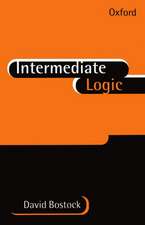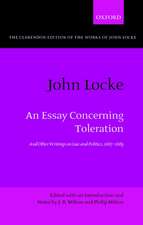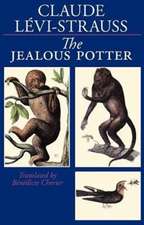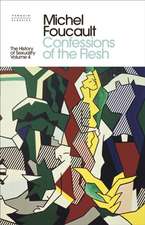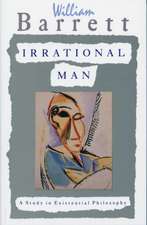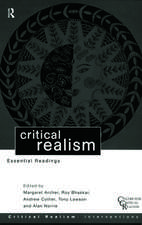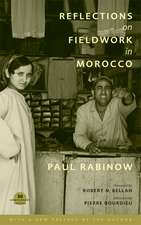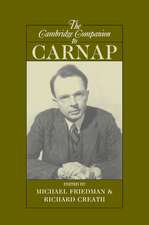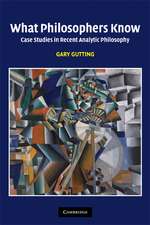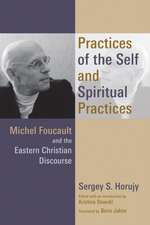Michel Foucault: Beyond Structuralism and Hermeneutics
Autor Hubert L. Dreyfus, Paul Rabinowen Limba Engleză Paperback – 15 dec 1983
This book, which Foucault himself has judged accurate, is the first to provide a sustained, coherent analysis of Foucault's work as a whole.
To demonstrate the sense in which Foucault's work is beyond structuralism and hermeneutics, the authors unfold a careful, analytical exposition of his oeuvre. They argue that during the of Foucault's work became a sustained and largely successful effort to develop a new method—"interpretative analytics"—capable fo explaining both the logic of structuralism's claim to be an objective science and the apparent validity of the hermeneutical counterclaim that the human sciences can proceed only by understanding the deepest meaning of the subject and his tradition.
"There are many new secondary sources [on Foucault]. None surpass the book by Hubert Dreyfus and Paul Rabinow. . . . The American paperback edition contains Foucault's 'On the Genealogy of Ethics,' a lucid interview that is now our best source for seeing how he construed the whole project of the history of sexuality."—David Hoy, London Review of Books
To demonstrate the sense in which Foucault's work is beyond structuralism and hermeneutics, the authors unfold a careful, analytical exposition of his oeuvre. They argue that during the of Foucault's work became a sustained and largely successful effort to develop a new method—"interpretative analytics"—capable fo explaining both the logic of structuralism's claim to be an objective science and the apparent validity of the hermeneutical counterclaim that the human sciences can proceed only by understanding the deepest meaning of the subject and his tradition.
"There are many new secondary sources [on Foucault]. None surpass the book by Hubert Dreyfus and Paul Rabinow. . . . The American paperback edition contains Foucault's 'On the Genealogy of Ethics,' a lucid interview that is now our best source for seeing how he construed the whole project of the history of sexuality."—David Hoy, London Review of Books
| Toate formatele și edițiile | Preț | Express |
|---|---|---|
| Paperback (2) | 255.86 lei 6-8 săpt. | |
| University of Chicago Press – 15 dec 1983 | 255.86 lei 6-8 săpt. | |
| Taylor & Francis – sep 1983 | 423.93 lei 6-8 săpt. | |
| Hardback (1) | 1007.36 lei 6-8 săpt. | |
| Taylor & Francis – 6 sep 2016 | 1007.36 lei 6-8 săpt. |
Preț: 255.86 lei
Nou
Puncte Express: 384
Preț estimativ în valută:
48.96€ • 53.17$ • 41.13£
48.96€ • 53.17$ • 41.13£
Carte tipărită la comandă
Livrare economică 22 aprilie-06 mai
Preluare comenzi: 021 569.72.76
Specificații
ISBN-13: 9780226163123
ISBN-10: 0226163121
Pagini: 256
Dimensiuni: 150 x 226 x 20 mm
Greutate: 0.41 kg
Ediția:Second Edition
Editura: University of Chicago Press
Colecția University of Chicago Press
ISBN-10: 0226163121
Pagini: 256
Dimensiuni: 150 x 226 x 20 mm
Greutate: 0.41 kg
Ediția:Second Edition
Editura: University of Chicago Press
Colecția University of Chicago Press
Cuprins
Preface
List of Abbreviations
Introduction
Part I: The Illusion of Autonomous Discourse
1. Practices and Discourse in Foucault's Early Writings
The History of Madness
The Archaeology of Medicine
2. The Archaeology of the Human Sciences
The Rise of Representation in the Classical Age
Man and His Doubles: The Analytic of Finitude
The Empirical and the Transcendental
The Cogito and the Unthought
The Retreat and Return of the Origin
Conclusion to the Doubles
3. Towards a Theory of Discursive Practice
A Phenomenology to End All Phenomenologies
Beyond Structuralism: From Conditions of Possibility to Conditions of Existence
The Analysis of Discursive Formations
Objects
Enunciative Modalities
The Formation of Concepts
The Formation of Strategies
Historical Transformation: Disorder as a Type of Order
Discursive Strategies and the Social Background
4. The Methodological Failure of Archaeology
Explanatory Power
Beyond Seriousness and Meaning
Conclusion: Double Trouble
Part II: The Genealogy of the Modern Individual: The Interpretive Analytics of Power, Truth, and the Body
5. Interpretive Analytics
Genealogy
History of the Present and Interpretive Analytics
6. From the Repressive Hypothesis to Bio-Power
The Repressive Hypothesis
Bio-Power
7. The Genealogy of the Modern Individual as Object
Three Figures of Punishment
Sovereign Torture
Humanist Reform
Normalizing Detention
Disciplinary Technology
The Objectifying Social Sciences
8. The Genealogy of the Modern Individual as Subject
Sex and Bio-Power
Confessional Technology
The Subjectifying Social Sciences
9. Power and Truth
Power
Meticulous Rituals of Power
Paradigms and Practices
Power and Truth
Conclusion
Questions
Truth
Resistance
Power
Afterword by Michael Foucault:
The Subject and Power
Why Study Power: The Question of the Subject
How Is Power Exercised?
Afterword (1983)
1. On the Genealogy of Ethics: An Overview of Work in Progress
History of the Project
Why the Ancient World Was Not a Golden Age, but What We Can Learn from It Anyway
The Structure of Genealogical Interpretation
From the Classical Self to the Modern Subject
2. Foucault's Interpretive Analytic of Ethics
Methodological Refinements
Interpretive Diagnosis
Genealogy
Archeology
Norms, Reasons, and Bio-Power
Beyond Foucault
Index
List of Abbreviations
Introduction
Part I: The Illusion of Autonomous Discourse
1. Practices and Discourse in Foucault's Early Writings
The History of Madness
The Archaeology of Medicine
2. The Archaeology of the Human Sciences
The Rise of Representation in the Classical Age
Man and His Doubles: The Analytic of Finitude
The Empirical and the Transcendental
The Cogito and the Unthought
The Retreat and Return of the Origin
Conclusion to the Doubles
3. Towards a Theory of Discursive Practice
A Phenomenology to End All Phenomenologies
Beyond Structuralism: From Conditions of Possibility to Conditions of Existence
The Analysis of Discursive Formations
Objects
Enunciative Modalities
The Formation of Concepts
The Formation of Strategies
Historical Transformation: Disorder as a Type of Order
Discursive Strategies and the Social Background
4. The Methodological Failure of Archaeology
Explanatory Power
Beyond Seriousness and Meaning
Conclusion: Double Trouble
Part II: The Genealogy of the Modern Individual: The Interpretive Analytics of Power, Truth, and the Body
5. Interpretive Analytics
Genealogy
History of the Present and Interpretive Analytics
6. From the Repressive Hypothesis to Bio-Power
The Repressive Hypothesis
Bio-Power
7. The Genealogy of the Modern Individual as Object
Three Figures of Punishment
Sovereign Torture
Humanist Reform
Normalizing Detention
Disciplinary Technology
The Objectifying Social Sciences
8. The Genealogy of the Modern Individual as Subject
Sex and Bio-Power
Confessional Technology
The Subjectifying Social Sciences
9. Power and Truth
Power
Meticulous Rituals of Power
Paradigms and Practices
Power and Truth
Conclusion
Questions
Truth
Resistance
Power
Afterword by Michael Foucault:
The Subject and Power
Why Study Power: The Question of the Subject
How Is Power Exercised?
Afterword (1983)
1. On the Genealogy of Ethics: An Overview of Work in Progress
History of the Project
Why the Ancient World Was Not a Golden Age, but What We Can Learn from It Anyway
The Structure of Genealogical Interpretation
From the Classical Self to the Modern Subject
2. Foucault's Interpretive Analytic of Ethics
Methodological Refinements
Interpretive Diagnosis
Genealogy
Archeology
Norms, Reasons, and Bio-Power
Beyond Foucault
Index
Notă biografică
Hubert L. Dreyfus is Professor of Philosophy in the Graduate School at the University of California, Berkeley.


